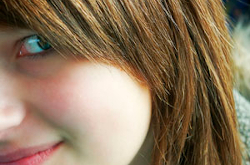피부 관리

Skin. It is the largest organ/ of the body. Skin/ is the body's first barrier/ to infection. It keeps out many harmful bacteria/ and other things. It also keeps all the things/ we need/ in our bodies.
The skin/ helps control body temperature. Glands/ on the skin/ release fluid/ to cool the body/ when it gets too hot. When a person/ gets too cold, blood passages/ in the skin/ become narrow. This helps to trap heat/ inside the body.
Like other organs/ of the body, the skin/ can have problems. Almost any teenager/ can tell you/ the most common disorder: acne. Acne/ is connected to hormones/ and how they affect the oil glands/ of the skin.
The skin/ gets its oil, called sebum, from the sebaceous glands. Each gland/ connects to a passage/ of extremely small hairs. The sebum/ travels through these passages. The oil/ reaches the surface of the skin/ through little holes, called pores. Sometimes, the sebum, hair and cells/ of the pores/ block these openings. This is/ how acne starts.
Bacteria/ can grow/ in a blocked pore. The bacteria/ produce chemicals/ and enzymes. White blood cells -- infection fighters -- travel to the area. All this/ leads to a growth/ on the skin, a pimple. This becomes red, hot/ and often painful.
Some people think/ eating chocolate/ or oily foods/ causes acne. Others/ blame dirty skin/ or nervous tension. Yet researchers/ tell us/ none of these cause acne.
So/ what does? Doctors/ are not sure. But they have some ideas. For one thing, they know/ that hormones/ called androgens/ are involved. Androgens/ cause the sebaceous glands/ to grow/ and make more oil.
Young people/ will not be happy/ about this next fact. Androgens increase/ when boys and girls/ enter their teenage years.
There are several treatments/ for acne. Mild cases/ are generally treated/ with medicines/ for use/ directly on the skin. These often contain salicylic acid/ or benzoyl peroxide.
People/ with more serious acne/ may be given antibiotic drugs/ to take/ by mouth. Or they might use a combination/ of other treatments.
One drug/ used to treat the most severe forms/ of acne/ is called/ isotretinoin. It is sold/ under different names, including Accutane.
Isotretinoin/ has been shown/ to cure acne/ in ninety percent of people/ who use it. The drug/ is normally taken/ for about five months. However, it can cause serious problems/ in some cases. If used during pregnancy, for example, isotretinoin/ can harm the developing fetus. That is/ why health experts/ strongly advise pregnant women/ and those who may become pregnant/ against using the drug.
Skin experts say/ there are simple ways/ to help prevent acne. One/ is to touch your face/ as little as possible, so as not to add oils/ or put pressure/ on the skin.
Another good idea/ is to avoid the urge/ to burst pimples. This can leave permanent marks/ on the skin.
Doctors also say/ to avoid strong cleaning products, and to be gentle/ as you wash and dry your skin.

